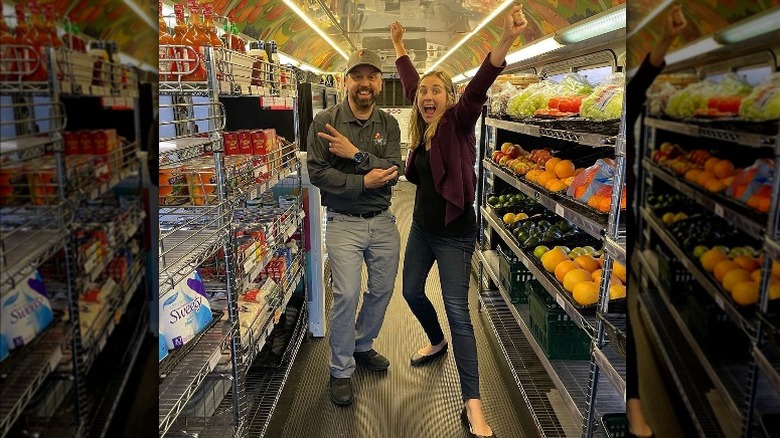How Mobile Food Markets Are Trying To Help Combat Inflation
Consumers are growing weary of leaving the grocery store with the same amount of food they usually buy but a far lighter wallet, thanks to soaring inflation. Grocery Dive notes that the cost of everything from protein to potatoes has seen a significant hike, with the price of food rising 8.6% since last year. Help might be coming to a horizon near you in the form of mobile food markets that aim to bring affordable produce and staples to communities struggling with skyrocketing food costs.
The Food Group is a non-profit organization based out of Minnesota that is working to bring healthy and affordable groceries to underserved communities via mobile markets. Executive Director Sophia Lenarz-Coy explained to "Good Morning America" that the organization understands that when consumers have to cut back their budget due to inflation, grocery lists often get pinched over fixed costs like buying medicine or keeping a roof over their heads.
The non-profit is operating 32 "Fare for All" pop-up locations (as of May 2022) that bring affordable groceries to nearly 10,000 customers annually. The group purchases food in bulk and offers fruits, vegetables, grains, and meat to customers, operating as a co-op that can offer lower prices when shoppers buy more. Minnesota isn't the only state seeing the benefits of mobile markets, and many areas are looking to expand the service as inflation continues to rise.
Mobile markets expand into more communities
The USDA expects another record-breaking year for the cost of food, predicting that food-at-home prices will increase between 5% and 6% in 2022. The agency cites many causes of rising prices, from the war in Ukraine affecting wheat and flour prices to the avian flu outbreak driving up the cost of poultry and eggs. Regardless of the cause, communities need assistance, and a few organizations hope to provide affordable groceries by expanding mobile markets.
Healthy Food Access notes the increasing popularity of mobile food markets and touts the success of mobile markets supplying groceries to areas that don't have access to a varied range of foods at affordable prices. One such example is Fresh Approach, a San Francisco Bay Area mobile farmer's market that offers a 50% discount to customers who participate in food assistance programs to further help consumers combat the high cost of groceries.
There seems to be no downward trend in sight for rising inflation, but organizations like The Veggie Van Training Center are working on expanding mobile markets to communities in need. The center hopes to make access to healthier, more affordable foods easier by providing training and resources to future mobile market owners and connecting communities to a market in their area.

